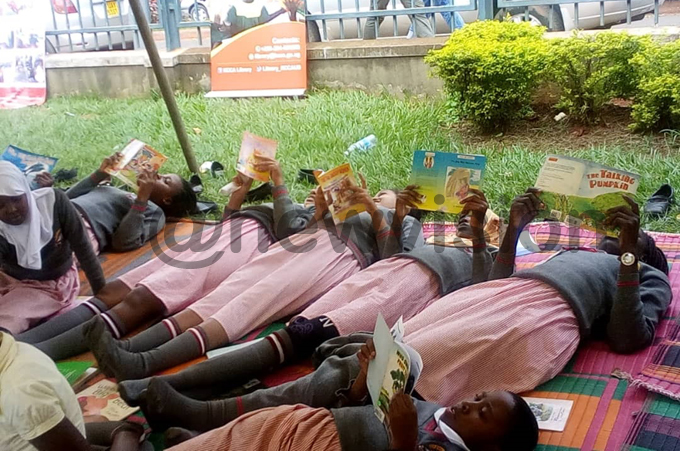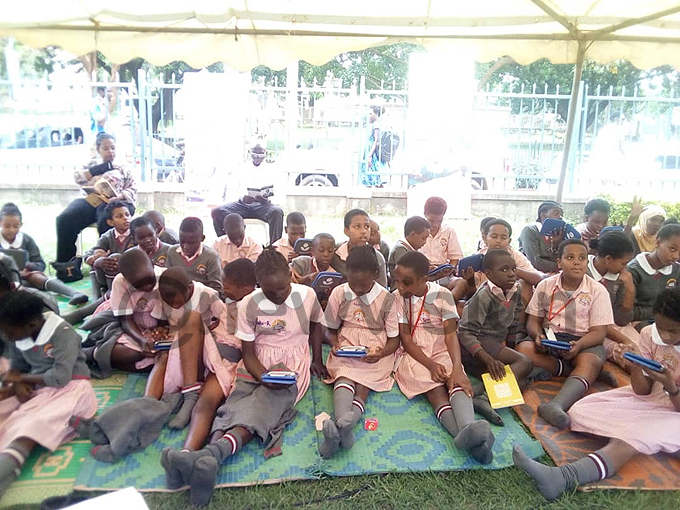Reading culture must start in the family
For the first time, the Uganda Literacy and Adult Learners Association (ULALA) together with Kampala City Council Authority (KCCA) organised the reading day in the heart of the city.
Muhammed Oundo struggles to read a short paragraph out of a random book he has chosen to recite for people gathered at the city square in the heart of Kampala city for the reading day.
His reading is not perfect, he stammers a bit but by all means, he has tried. The people gathered applaud him as he brings his reading to an end. This effort is part of the journey he has undertaken to learn how to read and write.
"In Bugungu Village the locals believed in my sincerity and asked me to contest for leadership. Today I am the Local Council I for my village but I do not know how to read and write which makes communication and leadership quite hard," he says.
Oundo, 38, lost his parents as a child and had never been to school. Having been elected as a local councillor in his village, Oundo yearned to learn, understand and serve his people better.
He joined an adult literacy class in Education and Development Initiatives (EDI) in Njeru-Buikwe district. "I have seven children, the eldest is in senior one, we read together and that is making it easy for me to learn how to read and write," reveals.
Joel Kisame, 19, is in the same situation as Oundo. He equally took time to read for those gathered for the literacy and reading day at the city square. He is also enrolled for the adult literacy class at EDI.

Children lying on a mat as they read story books
"It's shameful not to know how to read and write. You enter an office when you can't speak the common language and leave in shame," Kisame says.
Kisame who had stopped in primary one due to lack of fees now spends three hours daily learning how to read and write and also attends a carpentry class.
His reading and writing class costs him sh.100,000 annually and he hopes he can attain the qualification of a primary seven graduate to be able to communicate in life with ease.
Encouraging the reading culture
For the first time, the Uganda Literacy and Adult Learners Association (ULALA) together with Kampala City Council Authority (KCCA) organised the reading day in the heart of the city.
Books were brought closer to the people to interest them in reading and improve literacy, according to the National Coordinator ULALA Ismail Kasita.
A number of pupils from different schools from the city were in attendance on November 22-23, 2018, including guests from language schools, Makerere Refugee Law Project, KCCA Library, private booksellers and the National Library of Uganda.
The United Nations Educational, Scientific and Cultural Organization (UNESCO) defines literacy as the "ability to identify, understand, interpret, create, communicate and compute, using printed and written materials associated with varying contexts.
To be literate in Uganda, you have to be 15 years and above and can read and write. Literacy education is mainly managed by two different Ministries that include Education and Sports for formal education and non-formal education for children out of school.
Then the Ministry of Gender, Labour and Social Development, manages literacy education for non-formal adult education.
The government in 2002 put in place the National Adult Literacy, Strategic Investment Plan to improve literacy by 50 percent by 2015 but the target was not met.
In 2015, adult literacy rate for Uganda was 73.8 % and not 90% that was being aimed to meet the set target.
Universal Primary Education (UPE) was also introduced with the intention of providing free access to primary education and also improve literacy.
But according to findings from a study by the Directorate of Education Standards in 2016, almost six in every 10 primary school-going children are unable to read.
According to the Uganda Bureau of Statistics data Uganda has an illiterate population of 4.7 million.
Why illiteracy persists
According to the commissioner for community development and literacy in the ministry of gender, Everest Tumwesigye says illiteracy persists because of the poor reading culture.
"You find only those in formal education reading and they don't go beyond matters related to their studies," he says.
Tumwesigye adds the high cost of reading materials and the lack of a suitable reading environment at home and lack of reading space in the few urban public libraries that exist has not helped the improve the reading culture.
But he says the reading cults across all levels, ages and context and it never ends.
Studies in Uganda by the Uganda Bureau of statistics have shown that the regions with low level of literacy also have high poverty levels.

Pupils of Red Rock Junior School Lubiri
Equally many socio-economic surveys in Uganda have shown that education enhances lives it ends generational cycles of poverty and disease and provides the means for sustainable development.
Kasita says no country has ever developed without its people developing a reading and writing culture. He says Uganda must promote the reading culture and not just education literacy.
The Secretary-General of the Uganda National Commission for UNESCO Rosie Agoi equally emphasized that without the ability to read Uganda and the citizens can't achieve growth.
"Just think of it, if you do not know how to read you cannot achieve good health. We have heard stories of mothers who cannot read doctors prescriptions and end up over or under-dozing their children," Agoi explains.
She says with a high child mortality rate, Uganda cannot achieve the Sustainable Development Goals (SDGs).
"If you cannot read and you are in business, you can easily be cheated and this will keep you economically poor and also hinder the country from achieving SDG 1 which aims at eradicating extreme poverty by 2030," Agoi explains.
She says Civic education cannot be achieved too. Agoi says because of one's inability to read and understand issues they may not be able to distinguish a good and bad leader.
She says reading and literacy is fundamental for development and being able to read is a basis for good quality education.
Improving the reading culture and literacy
According to Agoi to improve the reading culture it must start from home then communities. "When I was a child, my mother would bring me and my siblings to a bookshop on Kampala road during holidays to pick books of our choice that she would buy for us. I can say I read almost all the Ladybird books, and I think it helped me, I studied literature and ended up as a literature teacher to what I am today," she reveals.
Agoi says once the reading culture is inculcated in the family both the children and parents become literate and achieve more from being well read and cultured.
"We need parents to get interested in reading so children pick interest too. Once the entire country is interested in reading our country will develop. We will achieve our goal of zero poverty, zero hunger, reduce bad health, less environmental issues, have better civic rights and exposure," she says.
Agoi emphasized reading is the basis for literacy. SDG 4 says ensure inclusive and equitable quality education and promote lifelong learning opportunities for all.
Agoi explained education is a fundamental human right and is indispensable for the achievement of sustainable development.
She says promoting literacy in a community and among young people is the way to go to achieve the SDGs.
"We cannot talk of a literate society if they can't read. Reading two paragraphs a day is enough because knowledge is empowerment," Agoi says.